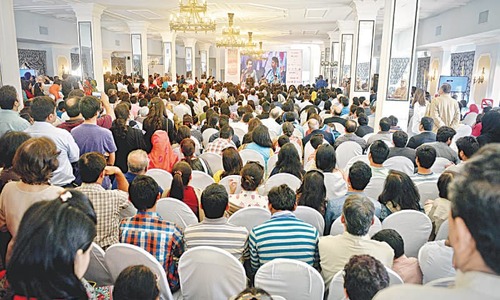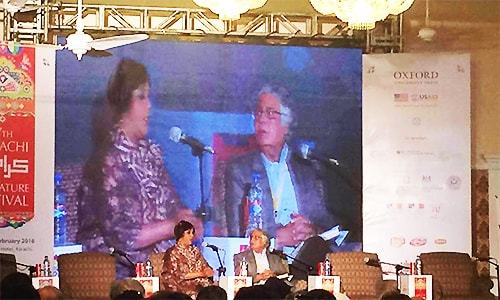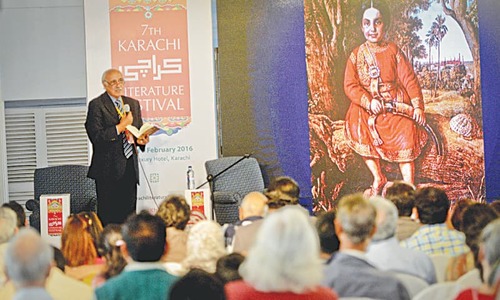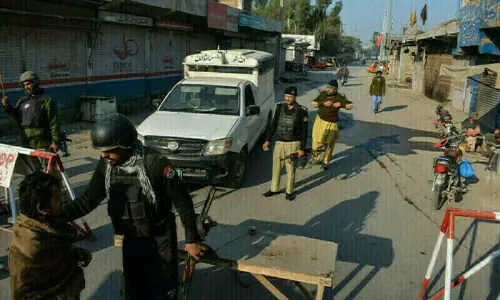KARACHI: Although personal chemistry between leaders is extremely important, it shouldn’t be mistaken for an objective condition for peace, former Indian minister for external affairs Salman Khurshid said at a session on India-Pakistan relations at the Karachi Literature Festival (KLF) on Sunday.
He said there were “conditions on the ground” that came into play each time peace was envisioned. Sitting beside two former foreign ministers and a veteran diplomat of Pakistan, Mr Khurshid said that after spending two days in the country he wondered, “If these are the people we have been dealing with, why is it that we are not friends as yet?”
Moderator F.S. Aijazuddin began the session, ‘What keeps us apart’, by asking the panellists whether there was a recipe to maintaining peaceful coexistence between the two countries.
Earlier in the afternoon, former foreign minister Khurshid Mahmud Kasuri tackled similar questions during the launch of his book, Neither a Hawk nor a Dove.
The dean of the Institute of Business Administration, Dr Ishrat Hussain, said economic diplomacy was the most ignored aspect of the Pakistan-India equation and that there was ample need to develop trade ties.
He said countries across the globe had moved on since 1947 and even those having fierce ideological differences had maintained trade ties over the years, such as China, Taiwan and the United States, and more recently, the US and Cuba. “There’s no doubt why these two countries (Pakistan and India) cannot achieve that,” he added.
Former US secretary of state Henry Kissinger had described relations between the two countries as the “dialogue of the deaf”, Mr Aijazuddin said. The conversation kept coming back to the “third wheel” in the relationship, the armed forces.
When asked whether the two countries could enjoy good relations under the watchful eye of the army, former foreign minister Hina Rabbani Khar said nobody could undo the fact that the military had ruled Pakistan for 30 of the 67 years of its existence.
“In that time, the military penetrated institutions and civilian systems deeply and incapacitated them to quite an extent. I found, however, that if the civilian institutions take themselves seriously and persistently fight their case through logical, rational discussions, the military can be taken on board,” she added.
Pakistan and India had reinvented the wheel, “(but) the unfortunate thing is, it’s a square wheel”, Mr Aijazuddin said. Should the foreign minister be an army general, he asked.
One good example of an able foreign minister was the late Sahibzada Yaqoob Ali Khan, he said. Did the military persona add to the foreign office, he asked Mr Kasuri.
He replied that Sahibzada Yaqoob was foreign minister at a time when the covert war in Afghanistan had begun. The war was not sanctioned by the US Congress and it was a CIA operation. Therefore, it would be unrealistic to expect the head of the US Central Intelligence Agency to meet the foreign minister of Pakistan, because by rule, the head of the CIA would meet Inter-Services Intelligence chief in Pakistan.
“Sahibzada (Yaqoob) was a retired lieutenant general of the Pakistan Army who happened to be the foreign minister at the time. In that period he became a conduit for the briefings that took place on Afghanistan,” he said.
“Protecting national interest does not necessarily mean building up national defence,” he said.
He added that this was not “unique to Pakistan” as all over the world the army gained authority wherever there were troubled borders.
Speaking of troubled borders, Indian journalist Barkha Dutt said that “protection provided to terrorists in Pakistan is a problem which will impact any agreement between the two countries”.
The panellists were asked to suggest ways to resolve the issue of Kashmir.
Mr Kasuri said huge optimism on the two sides would help, while Ms Khar said there was no need to restart the project because a lot of legwork had already been done on Kashmir and it just needed a right push at the right time.
Published in Dawn, February 8th, 2016


































